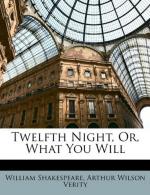|
This section contains 7,381 words (approx. 25 pages at 300 words per page) |

|
SOURCE: Logan, Thad Jenkins. “Twelfth Night: The Limits of Festivity.” Studies in English Literature 1500-1900 22, no. 2 (spring 1982): 223-38.
In the following essay, Logan claims that Twelfth Night—despite its ostensible depiction of a festive and happy resolution—contains glimpses of the darker side of human desire.
In a recent article, Richard A. Levin has remarked on the existence of “two alternate approaches to Shakespearean comedy”: the one, exemplified by the work of C. L. Barber and Northrop Frye, focuses on the comedies as celebrations of social order, in which the protagonists are engaged in growth and self-discovery; the other, practiced by W. H. Auden, Harold C. Goddard, and Jan Kott, finds in the plays a “serious treatment of psychological states” and a “negative comment about social conditions.”1 Levin attributes this bifurcation in critical response to the fact that our response to the plays is fundamentally complex, and it...
|
This section contains 7,381 words (approx. 25 pages at 300 words per page) |

|


